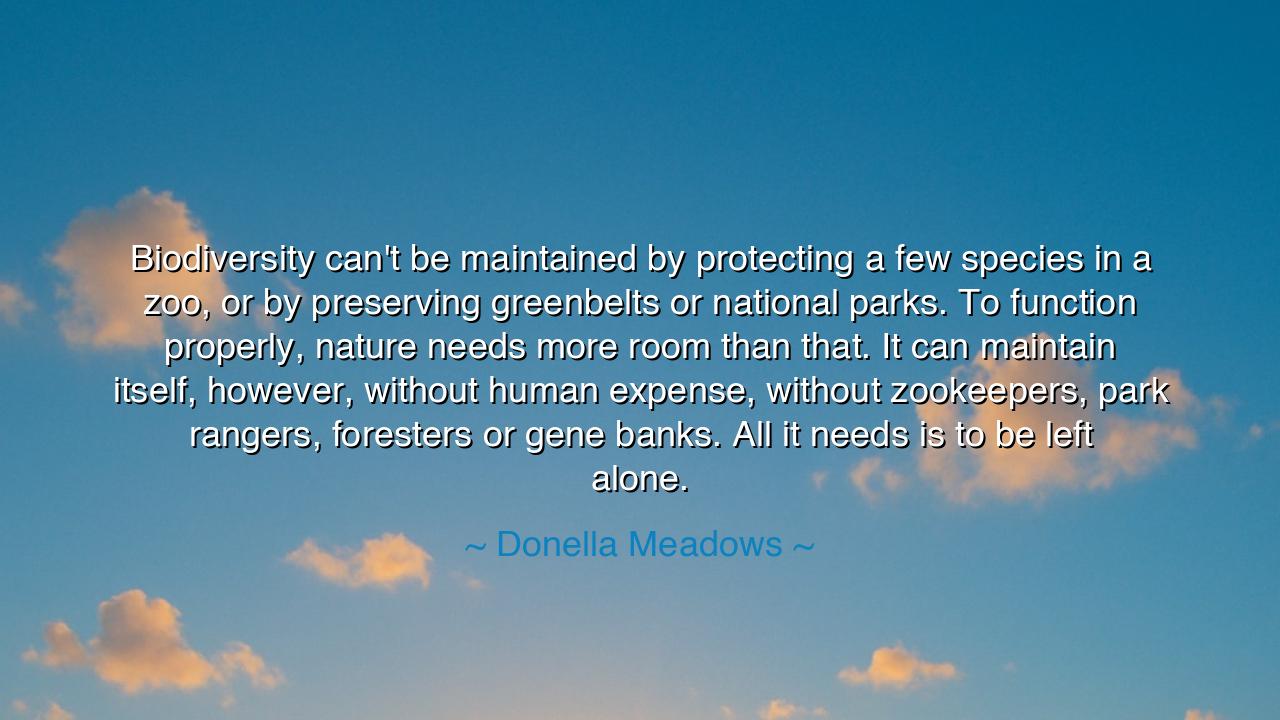
Biodiversity can't be maintained by protecting a few species in a
Biodiversity can't be maintained by protecting a few species in a zoo, or by preserving greenbelts or national parks. To function properly, nature needs more room than that. It can maintain itself, however, without human expense, without zookeepers, park rangers, foresters or gene banks. All it needs is to be left alone.






When Donella Meadows wrote, “Biodiversity can’t be maintained by protecting a few species in a zoo, or by preserving greenbelts or national parks. To function properly, nature needs more room than that. It can maintain itself, however, without human expense, without zookeepers, park rangers, foresters or gene banks. All it needs is to be left alone,” she spoke as both a scientist and a prophet — one who had looked deeply into the heart of the Earth and understood the ancient law of balance. Her words are not only a warning, but a plea: that humanity, in its arrogance, must learn humility before the wisdom of the natural world. She reminds us that nature is not a creation of man, but the mother of all things — vast, self-sustaining, and complete in her design.
Donella Meadows was one of the great voices of environmental truth in the twentieth century, best known for her work The Limits to Growth. She studied the systems of the Earth — how forests breathe, how oceans regulate life, how invisible cycles connect every creature to every other. Her words were born from observation and reverence. In this quote, she confronts a dangerous illusion of modern civilization: that by building parks and zoos, by setting aside fragments of land, we have somehow repaid our debt to nature. But to contain nature is to misunderstand her essence. For nature is not a prisoner in a cage, nor a garden to be trimmed and tended; she is wildness itself, the boundless force that shaped us long before we could name her.
To say that “nature needs more room” is to speak of freedom — the freedom of rivers to meander, of forests to fall and grow again, of wolves to roam and deer to flee, of life to rise and decay without interference. When we fence her, when we manage her, when we confine her to parks or sanctuaries, we are not protecting her; we are diminishing her. Meadows saw clearly that true biodiversity — the infinite dance of life — cannot be preserved in fragments. The Earth thrives through interconnection. The smallest seed and the largest predator are bound in a single tapestry. Tear away one thread, and the whole begins to unravel. Thus, our duty is not to control, but to step back, to make space for life to live on its own terms.
The ancients understood this truth. In the forests of old, the Druids worshipped among the oaks not because they ruled over them, but because they knew they were part of them. The Native peoples of the Americas walked lightly upon the land, taking only what was needed, offering thanks for every hunt, every harvest. They did not see themselves as masters of nature, but as kin to all living things. In that reverence lay wisdom — the same wisdom Meadows speaks of when she says nature “needs only to be left alone.” It is the humility of recognizing that the Earth governs herself, and that our role is not to command her, but to live in harmony with her rhythms.
Consider the story of Yellowstone’s wolves. For decades, humans believed they could manage the park better by eradicating the predator. The wolves were killed, and the deer multiplied unchecked. Forests were stripped bare, rivers changed their course, and life began to decline. But when the wolves were finally reintroduced, balance returned. Trees grew again along the rivers; birds and beavers came back. The land healed itself — not through human management, but through the restoration of nature’s own laws. It was a living testament to Meadows’s truth: that life needs no keeper. It will right itself when left to its own wild intelligence.
The wisdom of this teaching is both simple and profound: the Earth does not need our mastery; it needs our restraint. We are quick to build, to control, to fix — and yet our greatest act of love may be to withdraw, to give space, to trust in the perfection of what already is. Every forest we leave untouched, every ocean we allow to breathe, every field we let return to wilderness is an offering to the divine order of life. To “leave nature alone” is not indifference; it is reverence — an act of faith in the intelligence that designed the stars and the soil alike.
So, my children, learn from this: to protect the world, we must first stop trying to own it. Let go of the illusion that our stewardship requires constant control. Instead, learn the art of stillness — the discipline of leaving things as they are. Let the rivers run free. Let the mountains stand silent. Let the forests reclaim what was stolen. For nature’s balance is older than our civilizations and wiser than our science. When we step back, she steps forward, and life, abundant and unrestrained, returns.
Remember, then, the eternal truth of Donella Meadows’s words: “All it needs is to be left alone.” In those few words lies the salvation of the Earth. For the moment we learn to trust the natural order, to honor its independence, and to see ourselves not as owners but as children of this living world, the healing will begin — quietly, beautifully, and without our command.






AAdministratorAdministrator
Welcome, honored guests. Please leave a comment, we will respond soon